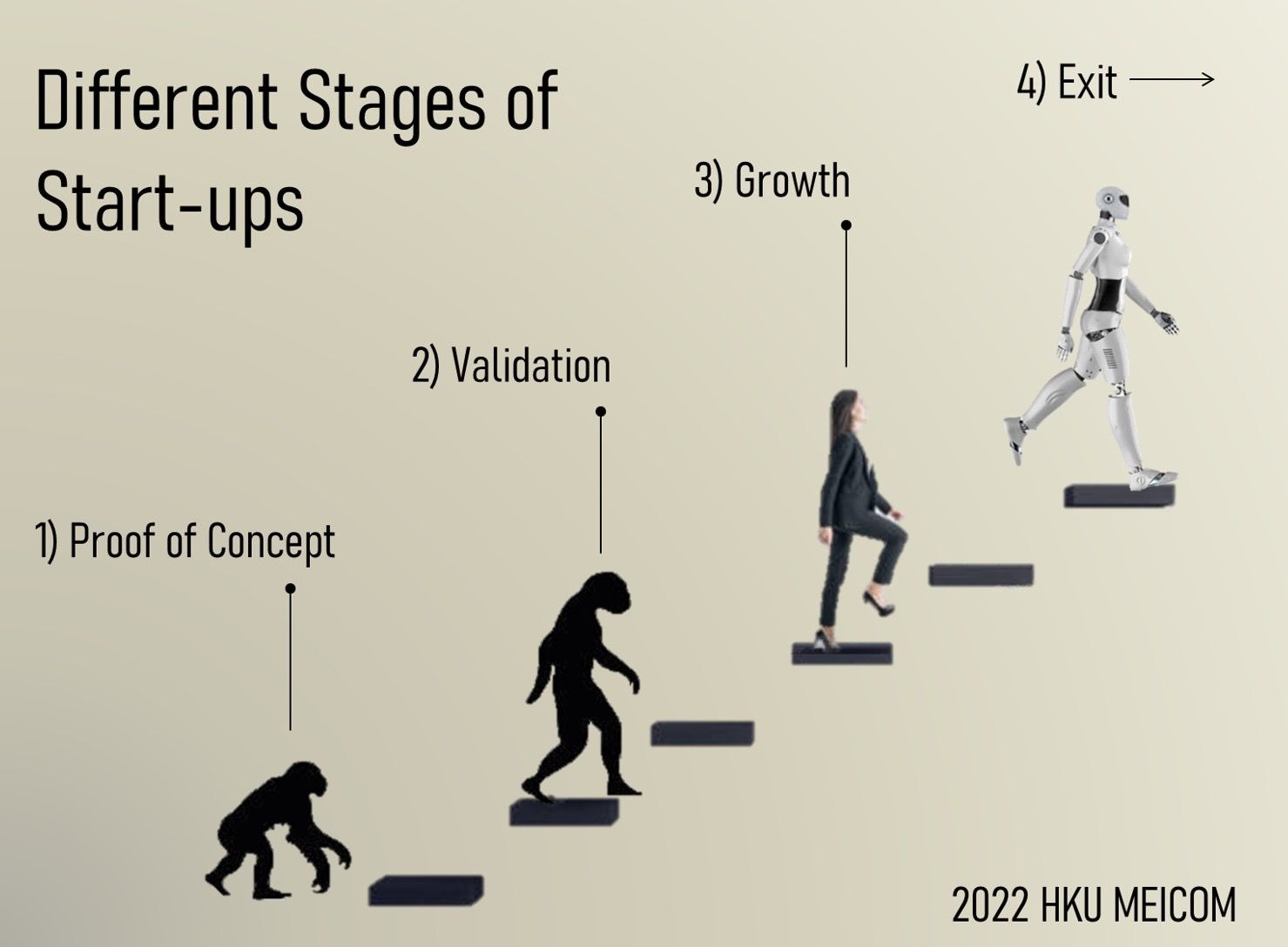
Entrepreneur stories in Hong Kong
In Dec 2021, Sensetime, the first unicorn at HKSTP successfully listed on Hong Kong Stock Exchange. Around five months later, Prenetics became the first HK unicorn listed on NASDAQ. Followed by Gogox, the first unicorn at Cyberport completed the IPO in June 2022. In less than a year, there have been a lot of exciting stories happening in the Hong Kong start-up ecosystem. However, does going IPO represent all the success of being an entrepreneur? What is more, do we really know the tricks and traps behind the scenes? What can we learn from someone’s entrepreneurial journey?
I am Jay Wong, the Vice President of HKU M.Sc in e-commerce and internet computing alumni association (hereafter “MEICOM”) who has been working in a government-funded digital tech incubator for over seven years. Today, I would like to talk about different stages of start-ups, alongside real-world projects that are operated by MSc in Electronic Commerce and Internet Computing (hereafter ‘ECIC’) alumni as examples.
1. Proof of concept stage
At the very beginning, before a company is formed. You first start to think about the business ideas, find your teammates, write your proposal and create prototypes. During the process, you might figure out what pain points you want to solve, the resources on your hand, including tangible and intangible, and the value you want to bring to the target potential customers. By estimating the budget and forecasting the chance of turning your idea into a successful business, you may decide whether to start your own entrepreneurship adventure.
Invisible Tech (https://www.invisibletech.asia/), is a start-up specializing in R&D, production, and distribution of Hi-End Audio IoT devices. The project was initially the final year capstone project of a team of MSc ECIC students. Patrick Lee is the CEO of the company and also MEICOM secretary for 2022-2023. He and his team got some creative ideas during the project stage, and wanted to “embed hi-end audio technology into varies designs of furniture, which allow customers to enjoy a Hassel-free high-quality audio experience”. After collecting potential customer feedback, the team decided to create a minimum viable product (MVP) and participated in various entrepreneurial competitions with their project. Finally, the project received different funding from the public and private sectors and is now incubated by the HKSTP.
2. Validation stage
However, having your MVP ready is just the start. The market is the true indicator that tells you whether the products or solutions fit the needs of your customers. Depending on the industries and your target customers and sales channels, the way you validate would be different while sales and profit would always be the golden metric for commercial products and solutions.
Michael Lo, the President of MEICOM for 2022-2023. He and his co-founder built a tea brewing machine “Let’s Tea” (http://letstea.co), using robotic arms to make freshly bubble tea in just a minute or so with their R&D team. Let’s Tea successfully enrolled Cyberport Incubation Program in 2019 and has deployed machines in the Cyberport campus, multiple office buildings, and shopping malls. In the past few years until now, it has been a crucial time for them to modify the machines, enhance the customer experience, increase tea flavor and ingredient choices, trying to change customer behavior from buying brewed tea in bubble tea stores to automated machines.
3. Growth stage
The market changes so rapidly, so as an entrepreneur. You always need to keep a growth mindset to run the business and lead the company move to the right direction. The process might involve building new teams, expanding to regional and overseas markets, and seeking multiple partnerships and collaboration opportunities. While registering your intellectual property, and investing in R&D activities may be considered long-term investments but those are something you could not miss out on as they create unique competitive edges in the market. Last but not the least, different rounds of funding raising, and /or financing may be necessary in order to financially support the development and growth activities.
Big Bang Academy (https://www.bigbangacademyhk.com/) , was co-founded by Nixon Chan, an ECIC graduate of 2018 who is listed on Forbes 30 under 30 Asia 2022. It is a Hong Kong-based steam education technology start-up that has raised HK$ 7 figures in seed funding investment led by Gobi Partners, with participation from family offices and experienced angel investors. After receiving the investment, their team expanded dramatically from 2 to 15 committed team members to speed up software development, movie and animation production, as well as enhance science education with adequate breadth and depth. The team shared a vision “ to make science fun and rewarding for children everywhere.”
4. Exit
There are various exit options, while IPO is the one that typically draws more attention from the public. It might take many years to be listed on public stock exchange markets. As an example, Sensetime and Gogox took around 7 years. Besides, other common exit options include M&As, selling the business, a close-down, or making the business your cash cow. There is no single definition of the success of a startup and an Entrepreneur. Nonetheless, success may not be a destination but a journey!
Getting excited?
How to Catch Your Dreams
iDendron, the innovation & entrepreneurship hub at HKU, cultivates an entrepreneurial and innovative culture on campus. The center and its programs have been incubating HKU early-stage startups and establishing interdisciplinary collaboration within the HKU community.
Furthermore, HKSTP and Cyberport support start-ups with low or free rental offices, financial grants and also provide extensive business networks, mentorship, and training. Some funding schemes serve certain purposes and target different stages of the companies, such as SIE supporting those projects with social impacts. BUD fund to support enterprises in branding, upgrading, and domestic Sales.
To learn more about some available funding in Hong Kong, please check out :
My Last Word
An idiom I remember regarding how to success: “Blood, sweat, and tears”. I’ve met with some charismatic startup founders who have different attitudes towards challenges, such as doing their best to implement business ideas, seeking the right talents and resources, and adopting the change of the people and market. It is the entrepreneurial mindset and execution abilities that matter.
Jay Wong
Vice President of HKU Master of Science in E-commerce and Internet Computing Alumni Association (MEICOM) for 2022-2023
